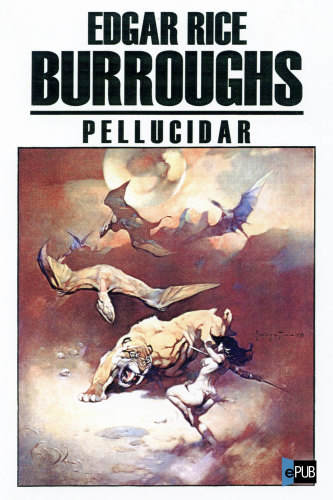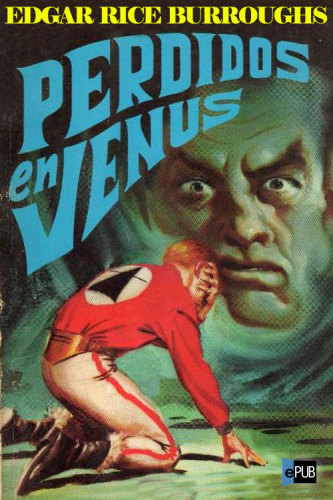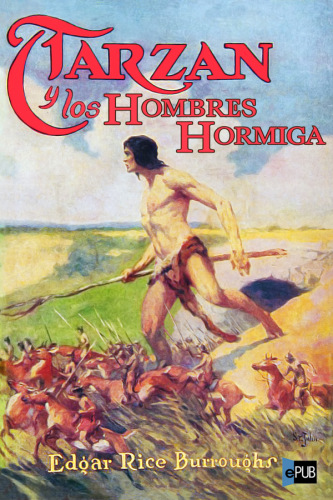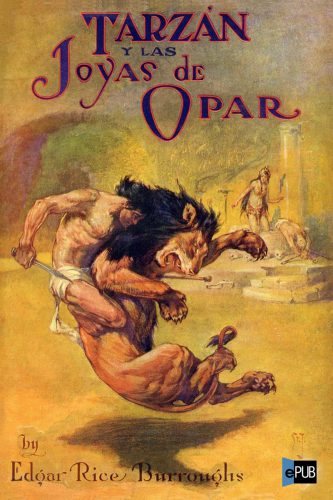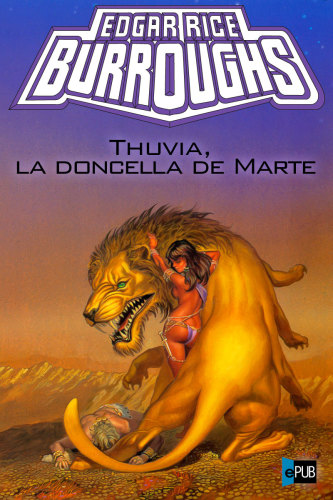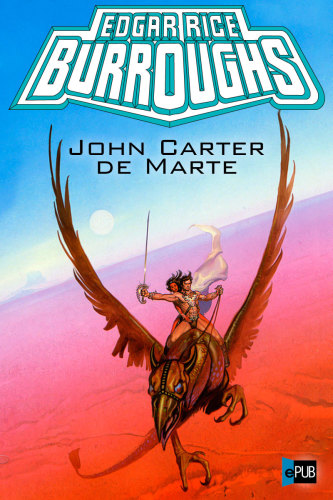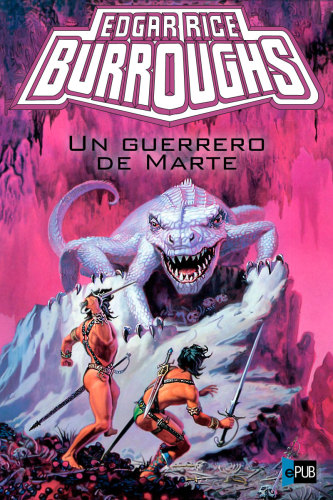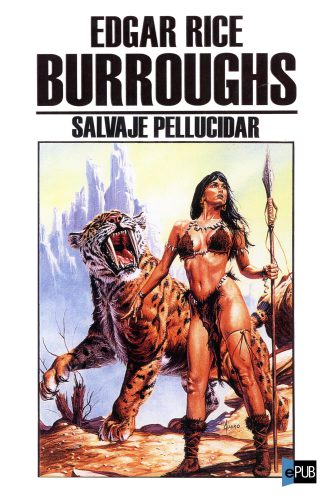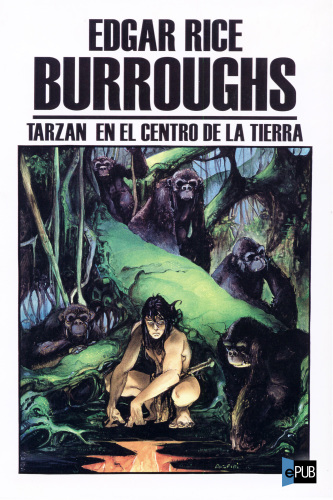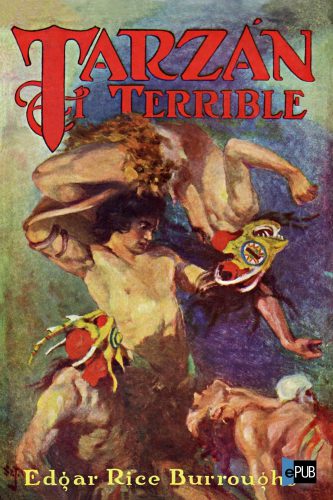oleebook.com
Huyendo de Venus de Burroughs_ Edgar Rice
de Burroughs_ Edgar Rice - Género: Ficcion
Sinopsis
Burroughs, Edgar Rice Year: 2010
Descargar
Descargar Huyendo de Venus ePub GratisLibros Recomendados - Relacionados
Reseñas Varias sobre este libro
One thing Edgar Rice Burroughs was never guilty of was a shortage of ideas. If anything he had a surplus of them. Sometimes this is a gift to a reader longing for stimulus, but at other times it's almost a tease to see so many of them scream by at break-neck speed. Imagine being raced past a buffet in a wheelchair and only getting as much as you can spoon up before the next thing comes. That's Escape on Venus.
This is late term Burroughs, the stuff from the 40s. It's much what Llana of Gathol was to the Barsoom series, a large swan-song made up of short adventures that sorta fit together. Un that book, however, this one doesn't hang together too well and parts of it just about drown in what amounts to self-parody.
I've mentioned in the past the differences between our hero Carson Napier and the beloved John Carter. In Lost on Venus it was almost charming that Carson was somewhat ineffectual and more human, but here in Escape on Venus it becomes cause for much frustration. I expect a Burroughs hero to get captured a lot and face indignities while trying to save his princess (yes, they all do that), but that hero also needs to whip out a weapon of some kind and kill some guys now and then. Carson Napier relies on his raygun (or r-ray pistol if you ) and much is made of him having it or losing it.
The r-ray pistol almost becomes the book's real focus in absence of a continuing plot. At one point the focus shifts to Duare and her efforts to rescue Carson, but even that segment becomes focused on the possession of the gun. I got so fed up about the heroes using the gun instead of their brains that a brief instance of improvised-weapons being used in the second segment felt some kind of gift.
I know this isn't really a serious entry from Burroughs and that he was playing it light in these late cash-grab stories (sure, he was always doing it for the money, but the late ones feel it), and there is some real entertainment to be had in fits and starts. The third segment involving a genderless race that reproduces by dividing is frustrating at first, but is almost redeemed by a punchline that turns the whole bit into a pun.
The other common theme in the book is ignorance. Carson Napier always manages to land his anotar in countries that have never heard of one-another and that insist that other hemispheres don't exist. Carson tells everybody up front that he's from another planet or just from California, and out of the dozens he meets only one believes him. Also, most kingdoms he finds proclaim themselves to be the biggest and best on the planet. A similar formula has worked for Burroughs in the past, but that may be because he took time with it before rather than parading out repetitive situations.
Really, more than anything else, the great sin of Escape on Venus is not the transparency, repetition, or idiocy, but the simple fact that it is nearly random and fails totally to come back to established elements or continue a single solitary thread of itself. The first three books varied in quality and tone, but each one built a new piece into the series and created enough side-plot in each entry to matter. Why can't we see the Thorists again? Why not get back to that tree-kingdom and settle things there? Hell, why couldn't we at least get back to the fish people from the first segment (they did threaten to dominate the world)?
The last segment of the book introduces no less than 4 civilizations and we pass through them a laxative.
I love Burroughs and for the most part I love this series (it's no Barsoom, nothing's as good as that), but here he's being so lazy that it's almost reading a pastiche by Michael Moorcock. The pieces are present, but the puzzle is not put together right. More than anything, this book reminded me of how completely awesome the previous book, Carson of Venus was. Damn, that one kicked some ass!
Sigh... call is 2 and a half.6 s blake460 13
I won this book (and some others) at various showings of...I wanna say time travel movies, but whatever, the theater was having a tie-in with a local comic book/paperback shop and this was a first edition of one of ERB's lesser known adventure stories. (Going for about $6 on Ebay currently so, yay, me.)
The thing is, ERB was the king of pulp fiction, so even his lesser stuff is still fun reading, and it doesn't really matter so much that this is book #4, because ERB knew well you might be picking up the book at any point. (To this day, I've only read #9 in his Mars series, which was great but really didn't need much backstory.)
In fact, the weakest part of this book is the language building part. He does it pretty well (again, going back at least to Tarzan) but there's a fine line between adding some color and overdoing it, and I felt he overdid it here a bit when describing the, uh, land navy.
The next weakest aspect of the book is that it's a series of essentially episodic short stories that have no narrative oomph when put together. Carson Napier and his mate Duare are stranded far away from home, and everywhere they stop they're captured and sold into slavery or worse. ERB even lampshades this by having Carson kick himself mentally the ... third? ... time this happens.
A virtual running gag is that everywhere they go, every tribe they meet is convinced there is absolutely nothing outside of their knowledge of the world. Venus itself as a whole has this mentality because they can't see beyond the clouds and so have no concept of stars, planets, the sun, etc.
ERB is crafty enough to keep things from getting too same-y, though, and we get fish people and plant people andI'm sure this was social commentarya couple of cities at war for ten years because neither are particularly competent enough to end things.
Some callbacks to earlier adventures, but nothing critical. And at the end, our heroes are back at home, meaning you could probably skip this book in the series and just go from #3 to #5. Heh. avoiding-ulysses-by-joyce reading-all-my-books-project3 s David AllenAuthor 4 books13
The fourth book in the Venus series displays a certain tiredness; I began losing track of the number of city-states and tribes Carson and Duare blunder into, and as always, coincidences and million-to-one chances abound. Still, ERB's fast pace and dry humor kept me reading.2 s Zachary Naylor54
In which the main character is a pistol.
I kid, barely: "Escape" sees the nadir of Burroughs' structural and conceptual resources for stories. Amtor has proven itself as Burroughs' 'sloppy seconds' at its finest, and this entry is no different--or rather, entries. I thought skipping the Tarzan-adjacent latter half of Pellucidar would spare me Burroughs' weakest work, but evidently the declining quality forced his hand into producing smaller, less reputable fare than previous (so reflected here).
As such, the plot is beyond barebones. Indeed, it is cyclical, repetitive, indulgent, and self-parodic in the extreme. "Escape" is functionally identical to Burroughs' latter-day works (read: Amtor in its entirety), repeated in smaller chunks four times in a row. Carson Napier and Duare escape a situation, get captured by some alien force, hatch an escape, and relinquish themselves of the situation. Just exchange "alien force" with fish-people, broccoli-people, amoeba-people, and military city-state soldiers and that's the whole book.
I've repeated often how iterative and familiar Burroughs' pseudoscience-fiction stories became, but "Escape" regurgitates this within its own pages, condensing the flaws of his style into banality.
I could go on, but there's not much to report beyond the four stories' amusing preference for technology over characters. Perhaps due to the pacing and serialization, Carson's R-Ray pistol becomes of crucial importance to nearly every situation; every plot becomes framed around how he may retrieve this lethal tool and fund he and Duare's escape. To a lesser extent, their 'anotar' (a plane from the finale of "Lost on Venus") is subject to much the same.
There is one diamond in the rough, saving this book from total irrelevance: Duare, previously a cardboard cutout on the level of Pellucidar's Dian the Beautiful, receives not only some characterful banter with her partner Carson (arguably moreso than John Carter and Dejah Thoris really did): she is the main character for a few chapters, as she unravels a botched escape attempt leaving her stranded with the book's only worthwhile villain. It's imperfect and all too short, but this is something that the other Amtor works totally lack, grandly bringing "Escape" up to their level by its inclusion. Not a high bar to clear, but still...
Amtor's twilight is upon us. I will admit, I started on this series for the sake of reaching "The Wizard of Venus," and the quality of this series has made that endeavor regrettable. But at least "Wizard" will be short; if "Escape" is guilty of any one thing, it's being four times larger than necessary. 1 Derek1,296 8
Burroughs is not at his best here. Sections set in the more outlandish lands--fish people, people who grow from plants, people who reproduce by binary fission--are, ironically, the least interesting to read.
Mostly because they follow the same tired formula: Napier and Duare are captured and held by particularly dull-witted enemies, and escape is a slow, enervating process containing more talk than action. It doesn't help that the protagonists themselves seem to take a stupidity pill at the same time. Two of the above, the Myposians and the Brokols, actually recycle the plot point of Carson protecting the tadpoles / sprouts of the people from predatory eagles.
It's only when Napier and Duare find themselves in lands where something interesting interesting is already going on that the story approaches excitement. They return a crown prince to his land of Japal, only to find that the city is held by usurpers while also being invaded. They literally fall into a generational war fought by fleets of land-dreadnaughts, whose combatants are in turn being harried by bandits and other third parties who take advantage of this mess.
In the land of the Brokols, Napier encounters their goddess--an amnesiac Earthwoman--who later suddenly disappears back to Earth without explanation. It's silly and random and strangely concluded but was oddly appealing as an out-there event that could have become something and was relatively fresh and intriguing as Burroughs did some thinking "out of the box". But, sadly, nothing comes of it.sword-and-planet1 David B514 38
In the final novel of Edgar Rice Burroughs's Venus series, stalwart Earthman Carson Napier and his mate, the beautiful Duare, are trying to find their way back to Korva, the country that became their home in the previous book. We follow them from mishap to mishap as they encounter a nation of fishmen, the cult of a strange goddess, a macabre museum whose living exhibits are paralyzed then mounted, and a war between navies of huge land-bound ships on a great plain. The story is episodic, reflecting its genesis as a quartet of pulp magazine stories, but lots of fun if you this sort of thing. Duare gets her own solo adventure this time around, a rare opportunity for an ERB heroine!1 John SpencerAuthor 6 books7
This one takes an acquired taste. Very straightforward action written by an E.R.B. who seems to have had a reality check. Obviously influenced by WWII; and for that reason this series is appealing for vastly different reasons than the good old Tarzan and John Carter of Mars tales. Carson Napier has a very distinct Dieselpunk feel to him, ala Sky Captain and The World of Tomorrow. Though "Escape" provides an exhausting volume of cliff hangers, I strongly encourage E.R.B. Fans to wade through each and every one in order that they acquaint themselves with a different sort of Burroughs hero. The series is one I've had on the to-do list for decades.heroic-fantasy science-fiction1 Ailish309
Classic ERB. Plenty of adventure and crazy coincidence. Once again the story ends abruptly and is suddenly wound up in one chapter.edgar-rice-burroughs pulp1 George1,923 14
#4 in the fantasy adventures of Carson Napier on the planet Venus. Carson, 27 years old, is a rich, handsome blond haired, blue eyed man has the idea of exploring Mars. He builds a rocket to do that, but because he fails to consider the moon's gravity in his calculations, ends up on Venus. On the mist-shrouded planet, advanced civilizations blessed with eternal youth co-existed with cities haunted by the living dead, where bloodthirsty man-beasts stalked the luminous nights; Napier knew how to survive the planets many perils. His adventures are recorded via telepathy to a man on Earth. This is also a political satire aimed at communism in which the villains, the Thorists, who start a revolutions solely to benefit themselves, play a background role. The ones Napier encounters are often stupid or incompetent.
Consisting of four interconnected stories: "Slaves of the Fishmen," "Goddess of Fire," "The Living Dead," and "War on Venus," Part 4 continues the perilous adventures of Napier and Duare. He rescues Duare who has been condemned by her homeland's ruling council and by her father, the king because she violated ancient tradition by allowing Carson to relate with her before she turned twenty. They fly away in his airplane thus starting another series of adventures for the two following the same pattern: lose Duare, find Duare, lose Duare with various life threatening adventures in between. First they are captured by fishmen and separated and get together and escape. Next they are separated again when Carson helps others and is captured, held prisoner for a while; manages to escape only to be captured again by a different group and held for several weeks by the people of the Goddess of Fire who magically disappears from a locked cage with Carson before he is able to rescue Duare. Then they are off again only to be captured a couple more times before the the story ends with them united and on the verge of reaching the destination they started towards at the beginning. Theresa3,560 12
This book really is four interconnected stories that were published in Fantasic Adventures between 1941 and 1942. As such Ill comment on each story separately.
Previously: thinking that Carson died during the war in Korva, Duare returned to Vepaja with her the father the jong. But Carson was not dead and he was able to find and rescue Duare from being executed by the laws of her own country. Now Carson and Duare are reunited and on their way back to their friends in the Korvan city of Sanara.
Slaves of the Fishmen. Carson & Duare are violently blown far north during an unusual atmospheric storm. When they finally are able to land they are captured by a strange race of amphibious warriors. The physical genetics of the people of Mypos is different and hopefully the change in leadership will help.
Goddess of Fire. After the fishmen war, Carson is captured by group of strange plant creatures and taken to Brokol as a slave to their non-plant goddess. Duare rescues him and they continue trying to get back to Korva.
The Living Dead. When the plane breaks Carson and Duare are forced to land in a city of human- amoebas who paralyze them, then put them on display on their museum wall. Again Duare rescues them, but this time they have a friend from Havatoo with them as they fly away.
War on Venus. Our group is almost back to Sanara when curiosity gets the better of Carson. Going too low to see something on the ground they get knocked out if the sky by a passing army and end up in the middle of a war.
Footnote: 1) How can they have a detailed conversation with people on the ground while flying overhead with no radio?
2) Its a good thing, and also rather convenient, that the plane didnt fail while they were in the middle of the ocean.
Alex Bergonzini508 45
Esta cuarta entrega es más floja que la anterior. Aquí no hay trama, salvo caer en las garras de una civilización cada vez más rara y esclavista que la anterior, poniendo a prueba la templanza de nuestros personajes y como interactúan con especies que se creen dueñas del universo en un mundo que dicen que es plano.
Tanta huida y captura llega a aburrir, incluso hay una de las historias que se asemeja a una de las aventuras de John Carter de Marte. Los nativos se vuelven más raros y resulta curioso como se sienten desconectados del mundo que les rodea. Mención especial merece la aventura con la Diosa Loto-El-Ho-Ganja que podría haber desarrollador un poco más y no dejándola en el misterioso olvido y resolviéndola tan fugazmente.
El aburrimiento se concentra en la historia de la batalla de Falsa, una cosa es que describa con audacia las aventuras y otra que mezcle con un toque militar una batalla de barcos terrestres, es en esta parte final del libro, donde la historia decae y el lector sólo desea que termine lo antes posibles.
A ver si con el siguiente y último libre de Venus, la magia vuelve a sus páginas.
Stefano AmadeiAuthor 9 books12
3 stelle e 1/2
Questo libro raccoglie tre volumi dell'autore, Carson di Venere, Odissea su Venere e Il Mago di Venere.
Il secondo libro raccoglie a sua volta tre mini-storie, tutte e tre pubblicate a puntate.
Continuano le avventure di Carson e di Duare costretti a fuggire da Vepaja per evitare una orribile morte. Si esce un po' dal cliché solito della principessa rapita e dell'eroe che la salva, anzi in più occasioni è proprio la principessa Duare a salvare Carson dal pericolo imminente.
La parte che ho maggiormente apprezzato è stata quella degli uomini pesce. Purtroppo si nota una certa "polverizzazione" delle vicende e un po' quasi ci si perde tra le miriadi di nomi e di città-stato.
Il Mago di Venere va letto a sè, non è nè carne nè pesce e i poteri mentali di Carson, beh, se li aveva John Carter li potrà ben avere anche lui, o no?
Il ciclo di Venere è concluso, tra qualche tempo inizierò Tarzan! Alton Motobu672 2
Carson and Duare are flying in their perpetual motion aircraft over the skies of Venus looking for their home city, but every time they land they are captured by the locals and imprisoned/enslaved. Eventually they escape and fly away only to repeat the process when they land again. This happens with half-fish men, then with humanoids who grow on trees, then with amoebas who take the form of humans. The final group, the Cloud People, who look naked owls, are they only ones who do not want to kill or imprison them; in fact they point the way home, and the story ends. This is just lightweight fluff which requires you to suspend your logic, reason and basic scientific knowledge. Don't try to take it seriously - it's just pure reading for fun if you this genre. But there is one unexplained mystery: who is Betty Caldwell?caveman-romance Martyn VaughanAuthor 11 books7
Burroughs had an incredible ability to keep a pounding narrative drive going throughout a novel. In this one Carson Napier is made a slave no less than three times but manages to escape in a believable way each time. His Venus series reads as more adult than Barsoom, but at the same time Napier's asides are quietly amusing. Also, he cannot be accused of stereotyping with regard to females as during one of his enslavements he is rescued by his mate, Duare, rather than the other way around.
All in all, a remarkably entertaining book. Jon38
Escape on Venus, published the year after World War 2 ended, has Carson and his wife Duare, imprisoned by fish people who they escape from, plant people who they escape from, and amoeba-people who they escape from. Although Duare has been the damsel in distress for the entire series of books, here she gets 5 chapters where she is the hero and rescues Carson from the amoeba-people. But then they get captured 3 times by people fighting each other in giant land-ships. Eventually, they escape and Duare gets to do some nice shooting as they leave the land and make it home.appendix-n fantasy sci-fi James T312
I d this much more than original trilogy. Its creative and fun. Classic ERB style purple adventure. The last 1/4 is definitely rushed though and I still wouldnt put the protagonist on par with John Carter. Jim286 8
This series had potential but ERB seemed spent. I did the third story "The Living Dead" because it follows the heroics of Duare giving her agency. It was still fun at times but it could also be tedious. Teemu Öhman229 15
Just the other series by ERB (except, for the most part, Mars series), the quality drops rather drastically at some point. That point in the Venus series is Escape on Venus. This was really quite bad.
The plot is straightforward: Carson (+some random other folks, including Duare) get caught by the bad guys simply because Carson does something incredibly stupid, and then they escape. Also quite often something extremely unly happens, which is crucial for the escape to succeed. And then the same thing happens again. And again. And again. It shows that this was just four (bad) stories lumped together.
The only positive thing about this was that for a brief moment Duare was something else than just a damsel in distress. However, during that segment ERB clearly didn't know who was telling the story. It wasn't Carson anymore, because he was being referred to in the third person. It could in principle have been the fictional ERB, but at least we weren't told about it. ERB obviously didn't put too much time or effort in this one.
If you've read the first three Venus books, just leave it at that. Don't bother with this one.
2.5/5, rounded up to 3 (as I am always being more positive here than in real life.)adventure fantasy science-fiction Kenneth1,060 60
This fourth Venus novel is a series of vignettes in which Carson and Duare have run-ins with various strange places, creatures and cultures, getting captured and escaping, etc. Darryl36 1 follower
Lacks something... Brian Lindsey7 1 follower
An episodic procession of increasingly improbable coincidences (nothing new for Burroughs!) but nevertheless quite fun. Even more action-packed than the previous Venus novels. Brook874 27
The last of the initially-published Venus series (Wizard of Venus was released in the 60s), this one's a bit longer (or feels that way) and is more of the same. There is one interesting thing, though, that stood out quite clearly after reading the first three.
I do not know if it was a result of changing social structure in America (the final book being published during WWII), Burroughs' changing mores, or something else, but the love interest, Duare, who for the first three books was often useless and screaming (as was normal for the time), here pilots aircraft and ships, fires small arms and cannons, rescues herself more than once, saves her male companions from certain death with plans of her own devising, and outwits male villains who have themselves outwitted her male companions. After the fainting and hand wringing of the previous novellas, this was quite a change. If I were scoring based upon social context, it'd get a better rating, but I'm not.
The stories are, of course, simple, really a series (and this was published as a series) of encounters with alien races, with the usual mix of friend and foe, and daring deeds. Burroughs even manages to tie in some older characters and close some story holes.
Being written when it was, you can also see a lot of "We American Individualists versus [Nazis and Fascists]". For a guy who was big into eugenics, it's interesting to see him apparently come around a bit and deride those "perfect" societies who reproduce asexually, for example.
everything else, it is a product of its times. Ron937 14
One of the first ERB novels I read, back in 1964. It's #4 in the Venus series but I couldn't find the first three so I read it anyway. I d it at the time and read it again circa 1968, but reading it now 50+ years later, Carson comes across as something of a smartass and his observations on the various cultures they encounter are not the most charitable and unworthy of a hero. Overall, the Venus series is more pulpy and disappointing compared to his Mars, Pellucidar, and Tarzan series. The villains are too obvious, unrepentantly evil, and the assorted civilizations each seem social experiments gone wrong. pulp_fiction science_fiction David Bonesteel237 29
In the final novel of Edgar Rice Burroughs's Venus series, stalwart Earthman Carson Napier and his mate, the beautiful Duare, are trying to find their way back to Korva, the country that became their home in the previous book. We follow them from mishap to mishap as they encounter a nation of fishmen, the cult of a strange goddess, a macabre museum whose living exhibits are paralyzed then mounted, and a war between navies of huge land-bound ships on a great plain. The story is episodic, reflecting its genesis as a quartet of pulp magazine stories, but lots of fun if you this sort of thing. Duare gets her own solo adventure this time around, a rare opportunity for an ERB heroine! Curtiss718 51
The stories of Carson Napier's adventures on Earth's sister planet are essentially ERB engaging in self-parody of the superior Barsoom stories. These stories are not high art, or even good sci-fi/fantasy; but ERB's Venus stories are fairly good yarns with exotic Venusian locales, fantastic beasts, flamboyant damsels, dastardly villains, and cliff-hanging adventures in which the hero gets the girl and the bad guy meets his (or her) just deserts.
[See, even I can engage in self-parody - see my John Carter story .]
fantasy science-fiction Alex22 3
How to ruin what would have been a great trilogy 101
Plot summary: he's caught, he's imprisoned, he escapes, he runs, he's caught, he's imprisoned, he escapes, he runs, he's caught, he's imprisoned, he escapes, he runs!!! Andy323 29
Not his best, but still an enjoyable adventure with Carson of Venus and Duare. Originally serialised as four different stories in the pulp magazine 'Fantastic Adventures' and collected in this book, therefore the plot was episodic and felt similar to 'Llana Of Gathol' from ERB's 'John Carter' Barsoom series. Worth a read if you the old interplanetary Sci-Fi adventure stories of ERB, Leigh Brackett, Otis Adelbert Kline etc. science-fiction Richard611 52
While I really enjoy these old planet adventure books they can be repetitive and downright tedious. I try to keep in mind, that this book, it was not meant as a whole novel but serialized into mini-adventures in the pulps. This was not one of Burroughs best, but it was still a great adventure story. In this one you encounter fish people, plant people, amoeba people, and translucent skinned fur wearing cloud people. Oh and of course Carson and Duare are made slaves everywhere they go. Jim95 5
The Amtor (Venus)series is my second favorite series written by Edgar Rice Burroughs. I used to walk to Grand Central and gather bottles along the side of the road. I would be able to collect enough bottles and turn them in for the deposit for the next book in this (and all of his series)series of books!jim-s Norman Cook1,503 18
Autor del comentario:
=================================
